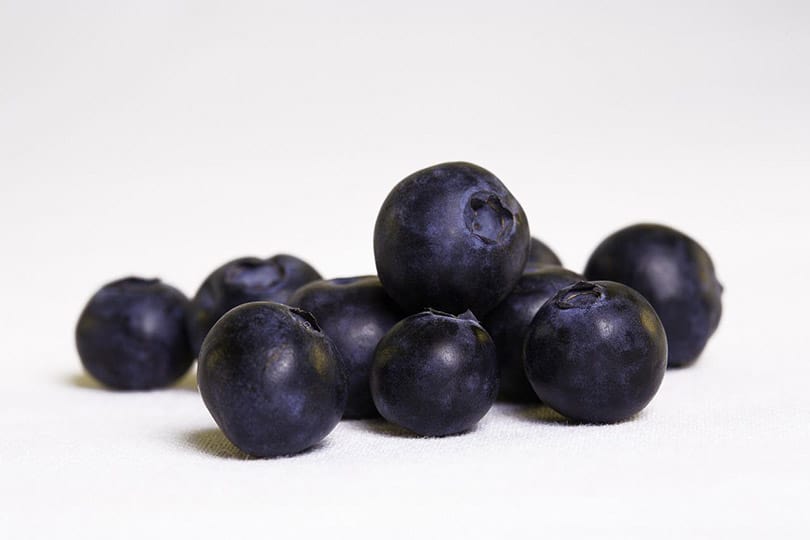Generally speaking, it is not advisable to give table scraps and other human food to dogs, even if they make us melt with their pleading puppy eyes. However, certain foods are allowed and can even be delicious, healthy treats for our beloved pooches. This is the case with blueberries. These delicious, colorful berries are packed with antioxidants and are an excellent source of vitamins and minerals. Therefore, these berries are healthy snacks for large or small pups.
Here, we explore what makes blueberries such great treats and how to occasionally incorporate them into your dog’s diet.
Why Are Blueberries Good for Dogs?
Blueberries are considered a superfood because they are packed with antioxidants, fiber, phytochemicals, iron, manganese, and vitamins A, C, and K. Additionally, some studies have shown that the vitamins and antioxidants found in blueberries can improve night vision, help prevent cell damage, and help decrease brain aging and maintain mental function in older dogs. They’re also low in calories and high in water, making them thirst-quenching treats in hot weather.
However, even though they are low-calorie treats, they should only be given to your dog in moderation. You must ensure that the calorie intake of any treats does not exceed 10% of the daily total of your dog’s diet.
How to Give Blueberries to Your Dog
Unlike cats, which are obligate carnivores, dogs are omnivores, meaning they need a combination of animal and plant matter to have a healthy, balanced diet. Since dog food sold at veterinarian offices or pet stores generally contains all the nutrients necessary for optimal health for your pet, you do not need to supplement their diet with fruits or vegetables. That said, blueberries aren’t toxic to dogs, so you can give them to your pet in moderation — basically, no more than a small handful every once in a while.
You can opt for fresh or frozen blueberries, as long as you wash them thoroughly to get rid of any pesticide residue. Also, given the small size of blueberries, watch your dog carefully to ensure that they do not choke while they eat.
However, it is best to consult your veterinarian before giving blueberries or other fruits to your dog for the first time. It is possible that these foods can negatively affect dogs suffering from diseases such as diabetes, kidney failure, or obesity.

What Other Fruits Can Your Dog Eat?
You can vary the treats that you give your pooch while taking care not to exceed the recommendation of treats being 10% of their total daily caloric content. The following fruits are safe for your dog to eat. However, do not forget to wash them and to remove the seeds and pits to prevent any risk of choking:
- Bananas
- Cantaloupe
- Other berries (cranberries, strawberries, raspberries)
- Seedless apples
- Peeled mango
- Peaches
- Pears
- Pineapple
- Watermelon
Which Fruits Can Be Dangerous for Your Dog?
Avoid giving the following fruits to your dog. Some contain toxins (persin in avocados and solanine in tomatoes) that can cause gastrointestinal problems for dogs. Other fruits or berries can cause stomach upset, diarrhea, vomiting, allergic reactions, and even kidney failure. If in doubt, always consult your veterinarian first.
Final Thoughts
As a dog lover and responsible owner, you may wonder what your pooch can or can’t eat. Fortunately, blueberries are on the allowable list, as long as you feed these succulent berries to your pet in moderation. Also, remember to talk to your veterinarian before introducing any new foods to your furry best friend’s diet.
Featured Image Credit: Pixabay














